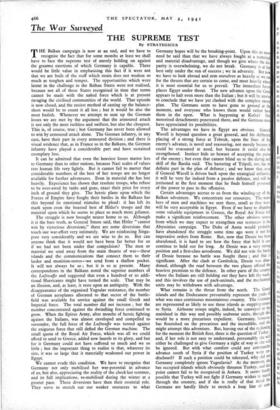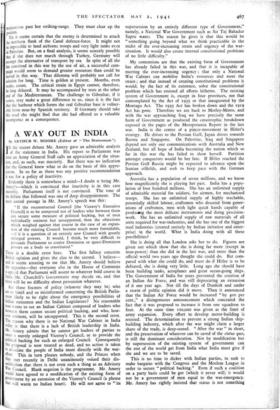The War Surveyed THE SUPREME TEST
By STRATEGICUS
THE Balkan campaign is now at an end, and we have to recognise the fact that for some months at least we shall have to face the supreme test of merely holding on against the greatest exertions of which Germany is capable. There would be little value in emphasising this fact if it were not that we are built of the stuff which strain does not weaken so much as toughen and temper. The opportunities which were latent in the challenge to the Balkan States were not realised, because not all of those States recognised in time that terms cannot be made with the naked force which is at present ravaging the civilised communities of the world. That episode is now closed, and the easiest method of casting up the balance- sheet would be to count it all loss ; but it would be also the most foolish. Whenever we attempt to sum up the German losses we are met by the argument that the armoured attack is not only the most ruthless and swiftest, but also the cheapest. This is, of course, true ; but Germany has never been allowed to win by armoured attack alone. The German infantry, in any case, have their part in every armoured division ; and there is visual evidence that, as in France so in the Balkans, the German infantry have played a considerable part and have sustained exemplary loss.
It can be admitted that even the heaviest losses matter less to Germany than to other nations, because Nazi scales of values rate human life very lightly. But it cannot fail to matter that considerable numbers of the best of her troops are no longer available for further adventures. Even in material she has lost heavily. Experience has shown that resolute troops, who refuse to be over-awed by tanks and guns, exact their price for every inch of ground they give. The heroic plane upon which the Forces of Empire have fought their battles in the Balkans has this beyond its emotional stimulus to plead : it has left its mark upon even the boasted best of Hitler's troops and the material upon which he seems to place so much more reliance.
The struggle is now brought nearer home to us. Although it is the bare truth, as General Smuts said, that Hitler " cannot win by victorious diversions," there are some diversions that touch our war-effort very intimately. We are reinforcing Singa- pore very considerably and we are wise to do so. But can anyone think that it would not have been far better for us if we had not been under that compulsion? The men or material we send away from the main theatre of war—these islands and the communications that connect them to their larder and munition-stores—we send from a shallow pocket. It will not always be so ; but it is so at present. Many correspondents in the Balkans noted the superior numbers of the Luftwaffe and suggested that even a hundred or so addi- tional Hurricanes might have turned the scale. That may be an illusion, and, at least, it rests upon an ambiguity. With the disappearance of the organised Yugoslav resistance, the number of German aeroplanes allocated to that sector of the battle- field was available for service against the small Greek and Imperial force. The total number did not increase ; but the number concentrated against the dwindling force continued to grow. When the Epirus Army, after months of heroic fighting against the Italians, was almost enveloped and compelled to surrender, the full force of the Luftwaffe was turned against the exiguous force that still defied the German machine. The small quota of the Royal Air Force, which was all we could afford to send to Greece, added new laurels to its glory, and but for it Germany could not have suffered so much and we so little ; but the important thing to realise is that, whatever its size, it was so large that it materially weakened our power in Egypt.
We cannot evade this condition. We have to recognise that Germany not only mobilised her war-potential in advance of us, but also, appreciating the reality of the check last summer, and its full implications, re-mobilised during the winter at a greater pace. These diversions have then their essential role. They serve to stretch out our weaker resources to what Germany hopes will be the breaking-point. Upon this no mo need be said than that we have always fought at a numeric and material disadvantage, and though we give where the di parity is overwhelming, we do not break. Germany is at h best only under the sun of success ; we in adversity. But no we have to look abroad and arm ourselves as heavily as we c for the thrusts that are certain to come, and most heavily whe it is most essential for us to prevail. The immediate futu places Egypt under threat. The new advance upon the Ca appears to halt even more than the Italian ; but it will be unw to conclude that we have yet clashed with the complete enem plan. The Germans seem to have gone to ground at th moment, and everyone who knows them would rather has them in the open. What is happening at Kufra? Ou motorised detachments penetrated there, and the Germans mus have appreciated its possibilities.
The advantages we have in Egypt are obvious. Gener Wavell is beyond question a great general, and his deliberate placing of a strong force at Tobruk, upon the lines of his enemy's advance, is novel and reassuring, not merely because could be evacuated at need, but because it could also strengthened. Instinct bids us beware of accepting the pra of the enemy ; but even that cannot blind us to the daring and skill of the Bardia raid. The battering of Tripoli, too, has its definite part in the plan of defence ; and we know that, even if General Wavell is driven back upon the strategical defensive, it will be very far indeed from a passive defence, and will be jettisoned at the first moment that he finds himself pcssessed of the power to pass to the offensive.
Certain advantages accrue to us from the winding-up of the Balkan adventure. We concentrate our resources. The num- bers of men and machines we sent there, small as they were, will be very acceptable in Egypt. Even if we have to abandon some valuable equipment in Greece, the Royal Air Force will make a significant reinforcement. The other obvious source from which we may expect to strengthen our resources is the Abyssinian campaign. The Duke of Aosta would probably have abandoned the struggle some time ago were it not for imperative orders from Rome. But, now that Dessie has been abandoned, it is hard to see how the force that held it can continue to hold out for long. At Dessie was a very strong position and a first-class aerodrome. We did not win the battle of Dessie because no battle was fought there ; and that is significant. After the clash at Combolcia, Dessie was aban- doned, although the road between the two places offered the heaviest premium to the defence. In other parts of the country where the Italians are still holding out they have left the roads. and this involves the use of pack-animals, and the mechanised units may be withdrawn with advantage. That remains is the threat from the north. The Greek islands and the Dodecanese presumably represent the peaks of what was once continuous mountainous country. The German) are represented as likely to use these islands as stepping -stone) to Syria. Airborne troops might, indeed, be conveyed to the mainland in this way and possibly seaborne units, though this would be a more precarious expedient. Germany, however. has flourished on the precarious and the incredible, and she might attempt this adventure. But, leaving out of the reckoning for the moment the British fleet, there is the question of Turkey. and, if her role is not easy to understand, presumably she will either be challenged to give Germany a right of way or she will be ignored. But with what comfort could any commander advance south of Syria if the position of Turkey were un- disclosed? If such a position could be tolerated, why did not Germany completely ignore Yugoslavia? At the moment, she has occupied islands which obviously threaten Turkey, and this point cannot fail to be recognised in Ankara. It seems hardly possible that Turkey will not fight if Germany wishes to marc: through the country, and if she is really of that mind . Germans are hardly likely to stretch a long line of 0°. munications past her striking-range. They must clear up the position. Yet it seems certain that the enemy is determined to attack the northern flank of the Canal defence-force. It might not be impossible to land airborne troops and very light tanks evm in Palestine. But, on a final analysis, it seems scarcely possible that if she does not march through Turkey, Germany will attempt the alternative of transport by sea. In spite of all she has contrived in this war by the use of air, a successful cam- paign would seem to demand greater resources than could be moved in this way. That dilemma will probably not call for solution for long. Time is golden at present. Months, even weeks, count. The critical strain in Egypt cannot, therefore, be long delayed. It may be accompanied by tests at the other end of the Mediterranean. The challenge to Gibraltar, if it comes, may make a great difference to us, since it is the fact that the harbour which forms the real Gibraltar base is vulner- able from near-by Spanish territory. If Germany should take this road she might find that she had offered us a valuable recompense as a consequence.































 Previous page
Previous page